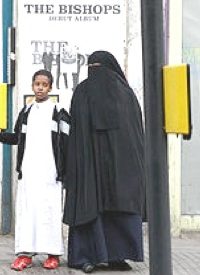
Only months after the French government banned the wearing of burqas in public (as in London, left), police in Australia have announced that they will begin to require suspects to remove their head coverings so that their identities can be confirmed. The French ban on the burqa came into effect in April, with punishments that emphasized assimilation into French society; as The Telegraph reported at the time the ban went into effect, the penalty for wearing a burqa is a “fine of 150 euros (£133) and/or a course of citizenship lessons. A man who forces a woman to go veiled will be fined 30,000 euros (£25,000) and serve a jail term.”
While the French ban on the burqa extends to all women in public places, the approach of the Australian police is far more limited in scope. Rather than banning the veil outright, police simply require that people who are suspected of committing a crime must reveal their faces so that their identity can be verified by law enforcement. A storyfrom the Australian Broadcasting Company (ABC) provides the rationale offered by Barry O’Farrell, the premier of New South Wales:
“I don’t care whether a person is wearing a motorcycle helmet, a burka, niqab, face veil or anything else, the police should be allowed to require those people to make their identification clear,” he said in a statement.
“I have every respect for various religions and beliefs, but when it comes to enforcing the law the police should be given adequate powers to make a clear identification.”
Mr O’Farrell says there has to be a balance between religious customs and a police officer’s ability to do their job.
“It’s also an issue with other religions. It’s also an issue with other cultures,” he said. “But whether it’s a driver’s licence or passing through customs, identity checks are required in this day and age and we’re determined to ensure police have the powers to undertake them when required.”
The new laws come in the wake of a successful appeal by a Muslim woman who had been sentenced to jail for falsely accusing a police officer of forcibly trying to remove her burka.
The difficulties of enforcing a ban on the burqa in either Australia or France has led to a new approach clearly intended to be more focused on the problem of verifying identity, rather than encouraging assimilation.
As R. Cort Kirkwood reported for The New American in April, the French ban on the burqa faced protests from Muslims living in France, but was widely supported by the French population: “The law passed with support of Right and Left, and the day the ban went into effect, London’s Daily Mail reported, signs of approval popped up in town halls. ‘The Republic lives with its face uncovered,’ one said.” Despite the approval of the law by the French people, it was little surprise when a legal challenge was quick in coming.
According to the AFP, a French Muslim couple living in Britain challenged the French ban on the burqa, and sued the government for damages:
The couple lodged an application at the Strasbourg court to challenge the French government over the ban on wearing Islamic veils, which they argue is “unnecessary, disproportionate and unlawful.”
They claim it restricts their right to free movement across the EU, according to documents sent to the court. The wife is seeking £10,000 (11,200 euros, $16,400) in damages for the alleged human rights breach. The couple live in the West Midlands with their two children. They have chosen to remain anonymous, citing “considerable hostility” in Britain and France to Muslim women wearing the full veil in public.
Meanwhile, the first two women charged under the new French law refused to remove their veils when ordered to appear for trial, and were thus refused entry to the court building. As reported on June 17 for The Telegraph:
Hind, who had brought her own handcuffs to wear as part of an organised protest at the court, replied: “I’ll keep my veil on at all times. It’s non-negotiable.
“The law forbids me from expressing myself, and indeed from defending myself. It forces me to dress a certain way, when all I want to do is live according to my religion.” Police are under strict orders not to remove face coverings themselves, meaning Hind was simply told to leave.
Their court appearance was accordingly abandoned, as state prosecutors began trying to work out how they can deal with the challenge to the new law. They are expected to come to a decision in September.
The difficulties confronting the governments in France and Australia highlight the complexities of contending with the practices of an aggressive, often foreign, minority which the majority population regards as inimical to the larger culture, and yet which the majority is unwilling to confront directly, lest it be perceived to be abandoning its commitment to post-modern cultural indifference. On-again, off-again efforts to tilt at the windmill of burqa-wearing Muslims can distract from the fact that the burqa is simply a symbol of a much more significant issue: The influx of a large population of individuals who are seemingly-irreconcilably hostile to the native culture of the countries to which they have moved. That Muslims scoff at the culture and beliefs of Westerners is hardly a surprise; the people of the West, however, appear to expect a magical transmogrification of militant Muslims into recruits for the ranks of indifferent, agnostic post-moderns. These developments in Australia and France are simply the latest facts to confront the illusion.



